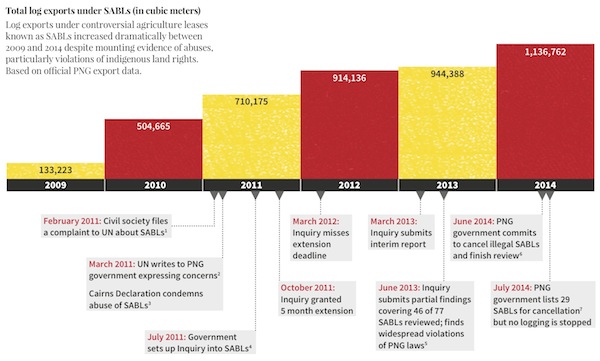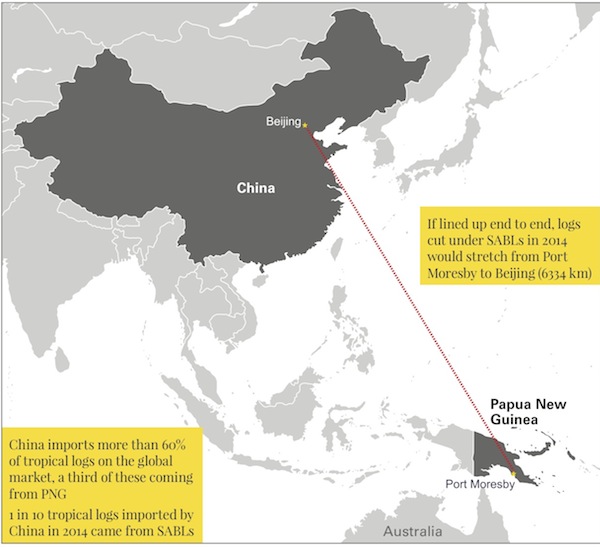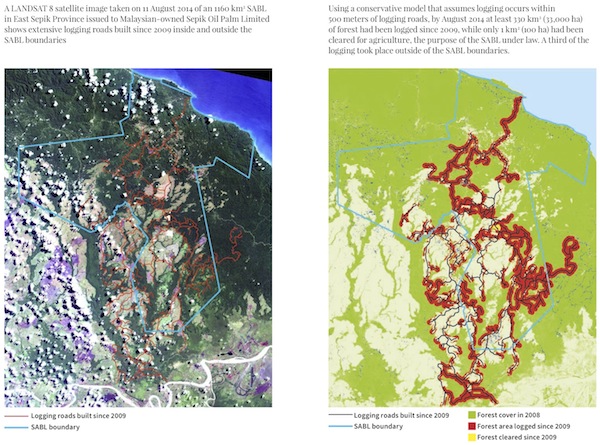
Source: Global Witness
As Papua New Guinea prepares to host government ministers from across Asia-Pacific for talks on the future of the region’s forests, Global Witness reveals how logging companies are making millions liquidating PNG’s rainforests, often illegally. The advocacy group’s investigations show that nearly a third of PNG’s timber exports in 2014 came from logging under agriculture permits at the centre of a nationwide scandal over widespread land grabbing.
This year’s meeting of Asia-Pacific Economic Cooperation (APEC) Forestry Ministers gets underway in PNG’s capital Port Moresby on October 27th, aimed at discussing how to preserve the region’s forests and combat illegal logging. Its host is the world’s largest exporter of tropical logs, with an export value of US$365 million last year. It also suffers from one of the highest rates of illegal logging in the world and rampant government corruption. (1)
Approximately 91% of PNG’s timber exports go to fellow APEC member China. Global Witness is calling on both countries to lead by example and commit to taking steps to address the crisis in PNG’s forests.
“This year’s APEC meeting on forests is being held in an epicentre of illegal logging,” said Rick Jacobsen of Global Witness. “For more than four years, the PNG government has stood by and watched while its people are stripped of their land and its rainforests wiped out under leases deemed illegal by its own investigation. Meanwhile, foreign-owned logging companies are making millions selling the timber to China. This inconvenient truth should be top of the agenda in Port Moresby this week.”
By 2014 nearly a third of PNG’s log exports came from highly controversial agriculture leases that have violated indigenous land rights and destroyed huge tracts of the world’s third largest rainforest. A 2011 inquiry into the leases commissioned by the government found that nearly all those reviewed were issued in violation of PNG laws. Despite this, timber exports under the leases has increased dramatically since the inquiry was set up, now accounting for an estimated 1 of every 10 tropical logs imported by China. (2)
From 2002 to 2011, the PNG government handed out over 50,000 km2 of land mostly belonging to indigenous communities using a mechanism known as a Special Agriculture and Business Lease (SABL) intended to promote agricultural development. After international outcry at their abuse, in 2011 the government set up a Commission of Inquiry to review the legality of the leases.
Global Witness analysis of official export data found that almost 40% of timber exports under SABLs through 2014 came from leases the inquiry concluded were issued illegally and should be revoked or suspended; the remaining 60% come from SABLs for which the inquiry did not produce recommendations after one of three Commissioners failed to submit his findings.
In 2014 the PNG government committed to cancelling illegal SABLs on the basis of the Inquiry’s findings and to completing the review, but 2 1⁄2 years after the inquiry’s findings were tabled the government has failed to stop a single logging operation while log exports under SABLs have increased dramatically.“The PNG government must stop all logging operations under SABLs until it has completed the review started by the Commission of Inquiry and cancelled all permits found to be issued illegally” says Jacobsen. “To help its trading partner tackle illegal logging, China should require its importers to carefully check their supply chains to ensure they do not buy timber produced in violation of source country laws.”
PNG has the lowest human development indicators in Asia. It was one of only three countries that didn’t meet any of their Millennium Development Goals, alongside North Korea and Zimbabwe. Rural communities in PNG, which account for around 86% of the country’s population, depend on smallholder agriculture and natural products harvested from forests, rivers and the sea for their daily survival.
Global Witness investigations into illegal timber grabbing in East Sepik Province
Global Witness’ analysis of one of the largest SABLs, covering 1,160 km2 – an area the size of Hong Kong island – in East Sepik Province, issued to a Malaysian-controlled company called Sepik Oil Palm Limited, shows that large areas of forest both inside and outside the SABL boundaries have been logged without any corresponding agricultural development, in violation of the purpose of the SABL under PNG law. (3)
The Commission of Inquiry found that multiple laws had been violated in the issuance of the SABL, in particular laws designed to ensure indigenous landowners consented to the project, and recommended it be revoked. The government included the lease on a list of SABLs to be cancelled in July 2014. Also in July, the National Court declared the lease illegal following a challenge from a group of local landowners. The decision was appealed to the Supreme Court, but the case has yet to be heard 15 months later while logging has accelerated.
In August 2015, the SABL holders successfully challenged the Commission of Inquiry’s findings in court on the basis of a technicality – that the report was submitted late – but the courts did not refute the substance of the Commission’s findings. The same court decision also quashed the government’s decision to cancel the SABL on the basis that significant investments had been made by the company. However, this did not take into account that by May 2015, logs valued at roughly $50 million had been exported under the SABL. Global Witness analysis of official export data and cargo ships tracked from the SABL area indicate that logging has significantly increased since the Inquiry published its findings, with more than 80% of the logs going to China.
Notes to editors
(1) The World Bank’s World Governance Indicators rank PNG in the bottom 25% of all countries in the categories of Rule of Law and Control of Corruption. Available at: http://info.worldbank.org/governance/wgi/index.aspx#reports. Transparency International ranked PNG in the bottom 20% – 145th out of 175 countries – in its 2014 Corruption Perception Index. An analysis of illegal logging levels in PNG by London-based think tank Chatham House concluded “Illegal practices are widespread, and the weight of available information...suggests that the majority of timber production in PNG is illegal in some way.” Available at:https://www.chathamhouse.org/publications/papers/view/198666
(2) A timeline of events and a summary of log exports under SABLs and the associated trade with China can be found in Figures 1 and 2. Analysis of official trade data indicate that in 2013 China imported roughly 9 million m3 of tropical logs out of a total global trade of 15 million m3, and PNG exported 3.2 million m3 of logs to China. In 2014, PNG exported 1.14 million m3 of logs from SABLs, of which approximately 90% were exported to China.
(3) The results of Global Witness’ analysis of satellite imagery are shown in Figure 3.


- ACTNOW's blog
- Log in to post comments
